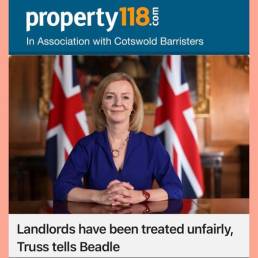Landlords have been treated unfairly, Truss tells Beadle – Property118.com, 13 September 2022
The newly published Decent Homes Standard is yet another example of lawmakers laying down rules without any understanding of the rental market – but the new prime minister has promised a sea change.
New prime minister Liz Truss says she feels landlords have been treated unfairly by previous governments and wants to create a less hostile environment.
In an exclusive interview, NRLA chief executive Ben Beadle told Property118 that he had spoken personally with Ms Truss at a leadership hustings and received firm assurances on the issue.
“She told me directly that she felt that landlords had been harshly treated these past years under a Conservative government and she wanted to create an environment that rather than landlords selling their properties and leaving the sector, that actually they remain and wish to invest,” said Mr Beadle.
“That’s a marked change from what we have seen for these past years and we shall be pushing hard to make sure that translates into more appropriate policies.”
“I’m looking at the new administration to review section 24 mortgage interest changes; I would like them to do something about stamp duty to make it more attractive for people to invest; I’d like them to build social housing; remove the freeze on the local housing allowance so people can better afford rents in their area, and I’d like them to look again at the way Department for Work & Pensions treats landlords when it comes to Universal Credit, which is frankly a disgrace.”
It seeks to imposes a minimum standard on homes in the private rented sector (PRS), previously reserved for public sector housing.
The new rules apply to new tenancies from 2025 and all existing tenancies from 2028. It is already illegal to let a property with an F or G rating, unless it is a listed building, when exemptions apply.
Mr Beadle said he had been giving evidence recently to the Fuel Fuel Poverty Commission – and had made the point that “while we all know we’ve got to play our part” on climate change, “lobbing in a hand grenade [on EPC ratings] 18 months ago and then having radio silence since is spooking people”.
He continued: “I think landlords can help governments achieve their aspirations. But I’m afraid if there isn’t help then landlords will sell some of their stock. We are already seeing a shrinking private rented sector – 260,000 homes have left the sector in the last five years, and look at what we are seeing: costs increase across the board, demand massively outstripping supply, yet rents are rising 3.2%, a rate lower than the social sector which was 4.1% in April.
“If we have landlords selling their properties, not only is there a likelihood that property will not stay in the private rented sector, reducing the pool of property available, the property won’t be available anyway. It will go into the owner-occupier sector and the government will be no better off.”
Mr Beadle said the NRLA wanted to see a far more pragmatic approach to energy. “Yes, we accept the private rented sector will need to play its part, but there does need to be support to enable landlords and property owners to help government achieve their aspirations.”
His comments were echoed by Ian Maitland, president of the South West Landlords’ Association, who said landlords had been pilloried for too long.
“Shelter takes statistics from a very small proportion of properties, they extrapolate them and then they feed them to government, and gullible ministers who then produce legislation that is totally unfit for purpose.
“Councils are as worried as our members are about the words ‘reasonable degree of thermal comfort’ when landlords are under so many other pressures from the legislation brought in by Mr Osborne in 2014.
“With interest rates going up, and the removal of mortgage interest relief, we can run through a list of how landlords have been over-regulated and overtaxed over the past eight or ten years, and to add this burden will surely send even more out of the market. Certainly many older landlords are getting out now.”
Mr Maitland added that the people who drew up the legislation were clearly unfamiliar with the standard of build in areas such as the West Country.
‘Some homes will never get a C rating’
“Some of their properties are horrendous and you will never get them to an D, never mind a C. Cornwall is a really good example. There is a dire shortage of housing, and they still can’t bring them up to a C.
“Does the local authority stamp on them and stop them letting them, so increasing the homelessness level? That’s the council saying that, not us. It’s not been well thought out.”
Mr Maitland said he had taken advantage of the Covid-era Green Homes grant, and applied external cladding to some of his terraced Victorian properties in Plymouth, at a cost of around £18,000-£20,000 per building.
Yet despite the new cladding, together with double-glazing and central heating, they still don’t meet a EPC rating of C.
He explained that external cladding also increased the likelihood of condensation and that steps have to be taken to increase the internal airflow to get rid of moisture-laden air and prevent condensation.
Landlords can only hope that the new prime minister is true to her word and instructs her new Housing Secretary Simon Clarke to have a rethink on EPCs, the energy aspect of the Decent Homes Standard – and the Renters’ Reform Bill.

